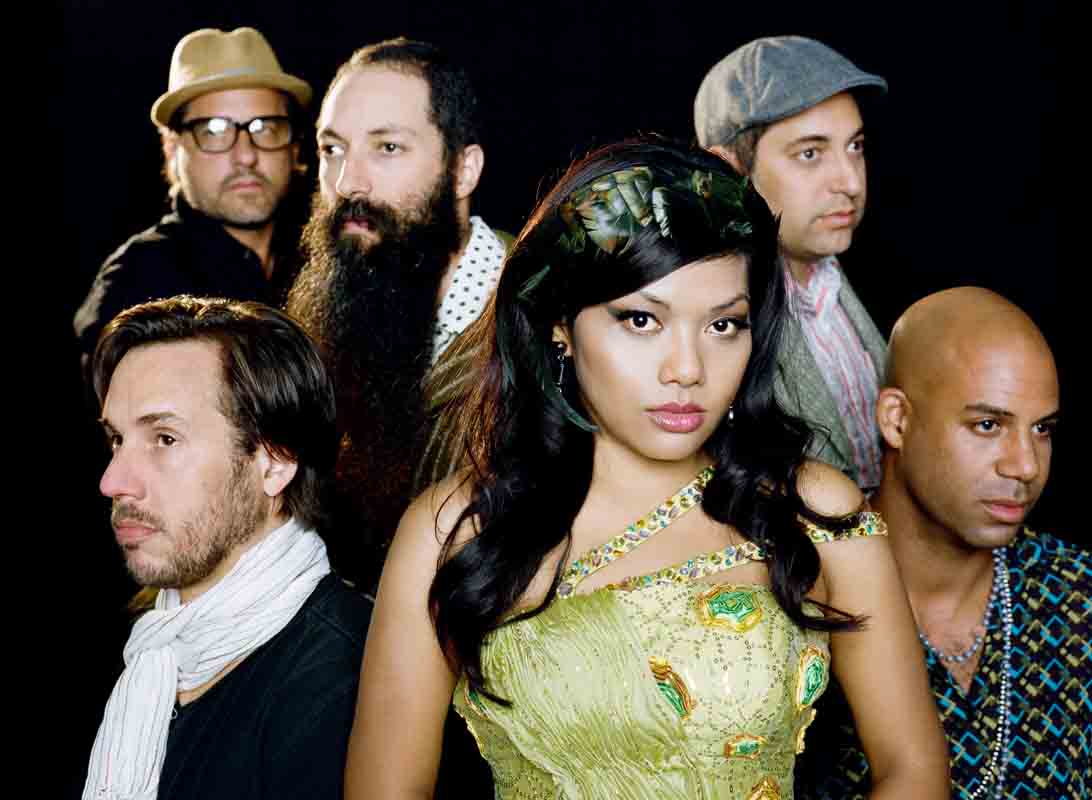“Doors-inspired Vox and Farfisa organs swirled around raging buzzsaw, fuzztone guitars and wild man of Borneo drums. This psilocybin soup was garnished by ethereal voices singing what sounded like Sanskrit chants invoked by Krishna and Radharani themselves run through a broken Echoplex reverberation machine. I played that CD until every cut was acid-etched into my cerebral cortex.” – Brad Warner, suicidegirls.com
THE KINKS’ RAY DAVIES hailed them “a cross between Led Zeppelin and Blondie”; Matt Dillon asked them to record a Cambodian version of Joni Mitchell’s Both Sides Now for his directorial debut, City Of Ghosts. Metallica’s Kirk Hammett picked One Thousand Tears Of A Tarantula – homage to legendary chanteuse Ros Sereysothea, forced by the Khmer Rouge to strip naked and sing under the merciless Cambodian Sun until she dropped dead from exhaustion – for the number two slot on his Rolling Stone magazine Best Music Of The Decade ballot.
Dengue Fever, the Los Angeles-based sextet who take ’60s Cambodian psyche rock and stuff it through a blender, are at risk of becoming accustomed to such high praise. The LA Weekly declared the band Best New Artist; Mojo counts them among its Top 10 World Music Releases; their songs have featured on everything from CSI: Las Vegas to True Blood. And now, 18 months after they last appeared in Phnom Penh, Dengue Fever are bringing it all back home.
The band’s beginnings on a dusty road en route from Siem Reap to Phnom Penh in the late 1990s have long been the stuff of legend. Farfisa organ player Ethan Holtzman, a Californian hipster backpacking through Southeast Asia, had hitched a ride in a beaten pick-up truck along with a friend who’d contracted the viral disease from which the band ultimately took its name. For eight hours, Ethan caught the captivating melodies of ’60s Cambodian rock wafting from the radio every time he poked his head through the window to check on his friend’s condition.
By the time Ethan returned to LA, his suitcase crammed full of Cambodian cassette tapes, his brother Zac had discovered the genre on his own while living in San Francisco. Zac took lead guitar and Ethan keys, adding saxophonist David Ralicke; drummer Paul Dreux Smith and bassist, Senon Williams. Chhom Nimol, their alluring frontwoman whose father sang with the great Khmer pop singer Sinn Sisamouth, was discovered at Dragon House in the Cambodian-American enclave of Long Beach. “When we first witnessed the power of Nimol’s voice filling the hall,” Ethan has said of that moment, “my brother and I were floored. We knew that she was the one.”
Nimol initially took a little convincing, not least because Zac boasts a beard worthy of an Orthodox rabbi and/or ZZ Top, and the journey has not always been smooth. Disaster nearly struck when Nimol was arrested in San Diego in accordance with stringent post-9/11 immigration policy: she’d arrived in the US on a two-week visitor visa and simply stayed on. She was thrown in jail for 22 days and it took nearly a year for the band’s lawyer to secure her a two-year visa (his fees were paid through benefit gigs).
But today, this extraordinary ensemble – whose sound is defined nowhere more eloquently than by Brad Warner on suicidegirls.com – is chiefly responsible for introducing global audiences to a lesser-known Cambodia; the Cambodia long obscured from international eyes by the pall of murderous Maoists. As Mark Jenkins writes in The Washington Post: “Imagine relaxing in a dive in Phnom Penh, Cambodia, circa 1965, brushing elbows with off-duty soldiers, local gangsters and Western diplomats as a hip band plays a mix of rock, soul, jazz, surf music, traditional Cambodian tunes and Henry Mancini and John Barry spy-movie motifs.”
Powerful stuff, not just on the global stage but where it all began – as evidenced in the documentary Sleepwalking Through The Mekong, which charts Dengue Fever’s first visit to Cambodia as a band back in 2005. During one sequence, filmed in The White Building where the band jammed with residents, a music teacher turns to the camera and says in Khmer: “When I saw them performing with my students I was just in awe. Nothing could compare to it. I knew they were foreigners, but when they played all these Khmer songs there was no class difference. We were all equal.”
With Dengue Fever setting their compass for a return to Cambodia this month, The Advisor caught up with impossibly tall bass player Senon Williams – who once told The New York Times that “underground people are getting hip to world music, and the world music side is getting hip to how you don’t have to have a dreadlock wig and Guatemalan pants to be cool” – to talk beards, psychedelic dreams and what it’s like being a moving déjà-vu.
Two burning questions I think everyone wants to know the answers to: what year was it when Zac last shaved and just how tall are you, really?
I would say Zac last shaved probably before he was conceived, so it’s got to be some time in the ’60s. [Laughs] It’s funny. When I first met Zac it was some time in the ’80s and he had long hair and no beard, so it had to be some time in the ’90s when he turned into The Beard Master.
